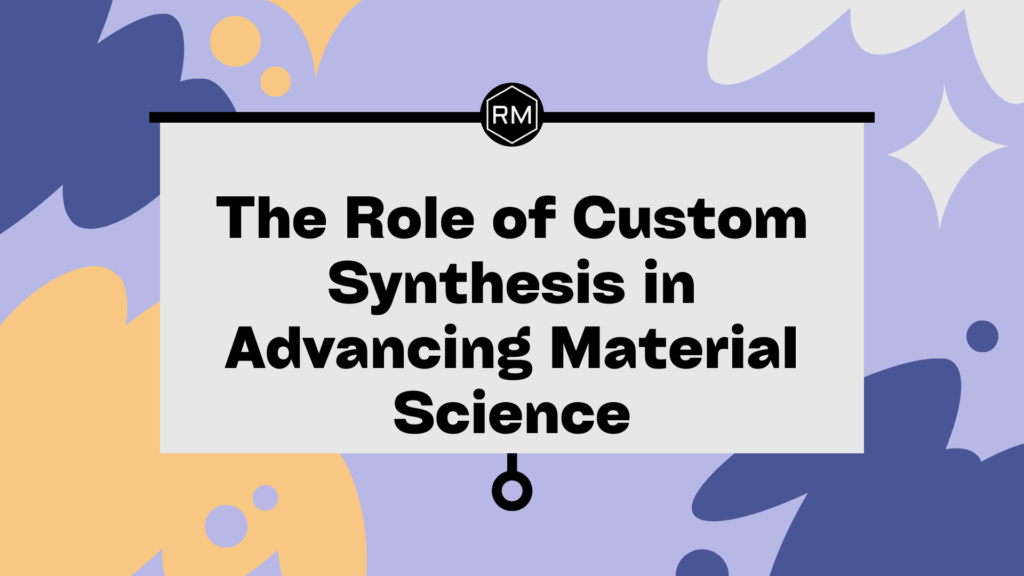
Introduction:
Material science stands at the intersection of chemistry, physics, and engineering, playing a pivotal role in developing new technologies that affect every aspect of our lives, from the electronics we use to the medicines we take. A significant driving force behind the progress in material science is custom synthesis, a process that allows scientists and engineers to create tailored molecules and materials with specific properties. This approach is essential for developing new, high-performance materials that meet the complex demands of industries ranging from healthcare to energy and beyond.
Custom synthesis involves designing and synthesizing molecules or polymers that do not exist in nature or are difficult to obtain. These materials are specifically engineered for particular applications, making them highly valuable in advancing material science. Whether it’s the development of biodegradable polymers for medical applications or the design of nanomaterials with unique properties, custom synthesis is revolutionizing the way we create and manipulate materials.
In this blog, we will explore how custom synthesis is contributing to advancements in material science, focusing on its impact on polymers, nanomaterials, biomaterials, and other areas of research. We will also highlight how services like those offered by ResolveMass Laboratories Inc. play a crucial role in providing custom synthesis solutions that push the boundaries of material science.
The Importance of Custom Synthesis in Material Science
Custom synthesis enables researchers and industries to develop specialized materials that would otherwise be difficult or impossible to obtain. By manipulating the molecular structure, researchers can create materials with enhanced properties such as greater strength, flexibility, conductivity, or biocompatibility. These customized materials are essential in a variety of fields, from the electronics industry to pharmaceuticals, environmental science, and biotechnology.
Custom synthesis allows for molecular precision, which is vital in ensuring that materials meet specific requirements for function and performance. Whether it’s creating new polymers for drug delivery systems or nanomaterials for renewable energy solutions, custom synthesis is integral to advancing material science.
Custom Synthesis of Polymers
Polymers are macromolecules made from repeating units of monomers, and their properties can be finely tuned to meet specific requirements. The custom synthesis of polymers enables the development of materials with precise molecular weights, architectures, and functional groups, providing researchers with a versatile toolkit for creating new materials.
One of the most significant applications of custom-synthesized polymers is in controlled drug delivery systems. For instance, Poly(lactic-co-glycolic acid) (PLGA) and Polycaprolactone (PCL) are biocompatible and biodegradable polymers used to encapsulate drugs, providing controlled release profiles and improving drug efficacy. Through custom polymer synthesis, these polymers can be tailored for specific drugs, disease targets, and release rates, making them indispensable in pharmaceutical applications.
Custom synthesis is also crucial in the development of polymeric materials for biomedical devices, coatings, adhesives, and films. For example, polymersomes, nanogels, and hydrogels are all created through custom polymer synthesis techniques. These materials have unique properties that make them ideal for a range of applications, from wound healing to biosensors.
At ResolveMass Laboratories Inc., we provide specialized custom polymer synthesis services that allow researchers and companies to design and develop advanced polymers with specific functionalities. Whether you’re looking for a new biodegradable polymer for medical devices or a polymer designed for industrial coatings, our expertise in custom polymer synthesis ensures that we meet your precise needs.
Nanomaterials and Their Role in Advancing Material Science
Nanomaterials have gained significant attention due to their unique properties, which arise from their nanoscale size and high surface area. Custom synthesis of small molecules and nanoparticles plays a crucial role in the creation of these advanced materials, which are used in a variety of cutting-edge applications, from energy storage to environmental remediation and medical diagnostics.
In energy applications, nanomaterials can improve the performance of batteries, supercapacitors, and solar cells. Custom-synthesized nanomaterials, such as quantum dots, nanowires, and graphene-based materials, are being used to enhance energy efficiency, storage capacity, and conversion rates. For example, graphene oxide, synthesized through custom chemical processes, has shown promise in solar energy harvesting and battery applications.
In medicine, custom nanomaterials are being developed for targeted drug delivery, where nanoparticles are functionalized to specifically interact with disease markers, ensuring that drugs are delivered directly to the site of action. This targeted approach minimizes side effects and enhances therapeutic outcomes. Additionally, custom nanoparticles are used in imaging and diagnostic applications, providing sensitive and precise detection of biomarkers in diseases like cancer and Alzheimer’s.
Through the custom synthesis of nanomaterials, researchers can control the size, shape, surface chemistry, and functionality of nanoparticles, which is essential for designing materials with the required properties for specific applications.
Biomaterials and Custom Synthesis for Medical Applications
Biomaterials are a class of materials used in medical devices, implants, and drug delivery systems. Custom synthesis is crucial in creating biomaterials with specific biological and mechanical properties that ensure compatibility with the human body and optimal functionality.
For instance, custom-synthesized hydrogels are used in tissue engineering to create scaffolds that support cell growth and tissue regeneration. These hydrogels can be designed with specific properties such as biodegradability, elasticity, and the ability to promote cell adhesion, making them ideal for a variety of medical applications.
In drug delivery systems, custom-synthesized polymers like PLGA, polyethylene glycol (PEG), and poly(lactic acid) (PLA) are often used to encapsulate drugs and deliver them at controlled rates over time. By customizing the molecular structure of these polymers, researchers can tailor the drug release profile, targeting specific sites within the body while minimizing side effects.
The growing field of regenerative medicine also relies on custom-synthesized biomaterials to create tissues and organs for transplantation and repair. These materials need to have precise properties such as mechanical strength, flexibility, and bioactivity, which can only be achieved through custom synthesis.
Sustainable and Green Chemistry in Custom Synthesis
Sustainability is becoming increasingly important in material science, and custom synthesis is playing a crucial role in creating eco-friendly materials that are both functional and environmentally responsible. The use of green chemistry in custom synthesis ensures that the materials are biodegradable, non-toxic, and made from renewable resources.
For example, custom-synthesized biodegradable polymers are being developed for packaging, medical devices, and agricultural products. These polymers degrade in the environment, reducing waste and minimizing the impact on ecosystems. Additionally, biobased monomers derived from renewable resources, such as plant-based sugars and oils, are being used in custom synthesis to replace petroleum-derived monomers in polymer production.
By incorporating green chemistry principles into custom synthesis processes, researchers are able to create sustainable materials that meet both performance and environmental standards. At ResolveMass Laboratories Inc., we are committed to providing eco-friendly custom synthesis solutions that align with the growing demand for sustainable materials.
Applications of Custom Synthesis in Material Science
The versatility of custom synthesis extends to a wide array of industries, where it enables the creation of specialized materials for applications such as:
- Electronics: Custom-synthesized materials like organic semiconductors and conductive polymers are essential for developing flexible electronics, LEDs, and solar cells. The precise control over molecular structure allows for improved conductivity, durability, and light absorption.
- Water Treatment: Custom-synthesized nanomaterials are being used to develop advanced filtration systems for purifying water. These materials can target specific contaminants, providing more efficient and cost-effective water purification solutions.
- Sensors: The custom synthesis of small molecules enables the creation of highly sensitive materials used in biosensors and environmental sensors. These materials can be designed to detect specific substances, making them invaluable in monitoring pollution and healthcare applications.
- Packaging: Custom-synthesized biodegradable polymers are being used in sustainable packaging solutions, reducing environmental impact and waste.
Conclusion
Custom synthesis is a cornerstone of material science, enabling the development of advanced materials that meet the specific demands of various industries. From polymers and nanomaterials to biomaterials and sustainable materials, custom synthesis allows researchers to push the boundaries of material design, opening up new possibilities in medicine, energy, electronics, and environmental protection.
At ResolveMass Laboratories Inc., we are proud to be at the forefront of custom polymer synthesis and other custom synthesis services, helping researchers and industries bring their innovative ideas to life. Whether you’re looking for a tailored biodegradable polymer for drug delivery or a nanomaterial for energy applications, our custom synthesis services are designed to meet your needs.
To explore our services and learn more about how we can support your material science research, visit our custom polymer synthesis page and discover our comprehensive solutions. If you have a specific project in mind, don’t hesitate to contact us for more information.
References:
- STEPHEN C. STINSON, Custom Synthesis Expanding for Drugs and Intermediates, Chem. Eng. News 1984, 62, 34, 25–4660, https://doi.org/10.1021/cen-v062n034.p025
Setting Alert Limits vs Action Limits for Nitrosamines: Practical Implementation Guide
Introduction In pharmaceutical manufacturing, understanding Nitrosamine Alert Limit vs Action Limit is critical for compliance…
Nitrosamine Batch Release Testing: When Is Routine Testing Required?
Introduction: The Nitrosamine Batch Release Testing Requirement becomes mandatory when confirmatory testing shows nitrosamine impurity…
Case Study: Sameness Evaluation of Octreotide Generic project submission to USFDA
Introduction: The Octreotide Sameness Study for ANDA submission is a critical regulatory requirement when filing…
Case Study: Sameness Evaluation of Liraglutide Generic project submission to USFDA
Introduction: The Liraglutide Sameness Study for ANDA submission is a critical regulatory requirement when filing…
CRO Checklist: How to Select the Best Lab for Peptide Sameness Study
Introduction: Choosing the Best CRO for Peptide Sameness Study is one of the most critical…
Common Deficiencies in Peptide Sameness Study During ANDA Review
Introduction: Peptide Sameness Study Deficiencies are a leading cause of regulatory delays during ANDA review…







